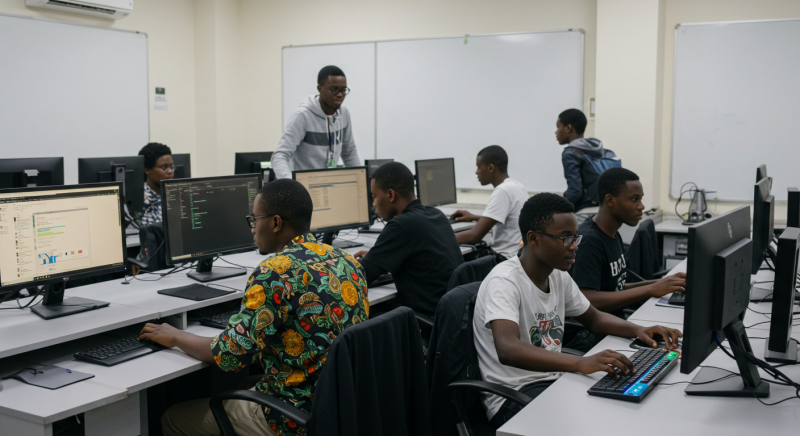The dream of becoming a cybersecurity expert in Nigeria no longer has to remain just a dream because of financial constraints. Every year, hundreds of brilliant Nigerian students miss out on pursuing their technology dreams simply because they cannot afford quality education. But what if I told you that there are numerous Nigerian cybersecurity scholarships waiting for students just like you?
Whether you’re passionate about protecting digital infrastructure or fascinated by data science algorithms, this comprehensive guide will show you exactly how to secure funding for your tech education journey. From understanding what these scholarships entail to navigating application processes, you’ll discover everything needed to transform your cybersecurity and data science aspirations into reality.
Key Takeaways
This guide provides you with actionable insights into securing Nigerian cybersecurity scholarships, including detailed information about Cybersafe Foundation partnerships, application strategies for data science funding, step-by-step processes for scholarship applications, eligibility requirements for various programs, and proven tips for creating winning scholarship applications.

Understanding Nigerian Cybersecurity Scholarships: What You Need to Know
Nigerian cybersecurity scholarships represent more than just financial aid – they serve as gateways to technological empowerment for students across the country. These funding opportunities have become increasingly important as Nigeria continues to establish itself as a major player in the global technology landscape.
The landscape of cybersecurity education funding in Nigeria has evolved significantly over the past decade. Organizations, foundations, and government agencies now recognize the critical need to develop homegrown cybersecurity talent. This recognition has led to the creation of numerous scholarship programs specifically designed to support Nigerian students pursuing cybersecurity and data science education.
Understanding these opportunities requires recognizing that Nigerian cybersecurity scholarships come in various forms. Some focus exclusively on undergraduate studies, while others support postgraduate research and specialized certifications. The funding can cover tuition fees, living expenses, equipment costs, and even international study opportunities.
The current cybersecurity skills gap in Nigeria presents both a challenge and an opportunity. According to industry reports, Nigeria needs over 50,000 additional cybersecurity professionals by 2027 to meet growing demand. This shortage has prompted increased investment in scholarship programs, making it an opportune time for students to seek funding support.
Step 1: Identify the Right Nigerian Cybersecurity Scholarships for Your Goals
The first step in securing funding involves understanding which types of Nigerian cybersecurity scholarships align with your educational goals and career aspirations. Different programs target different educational levels and specializations within the cybersecurity field.
Undergraduate scholarships typically focus on students pursuing bachelor’s degrees in cybersecurity, computer science, information technology, or related fields. These programs often require strong academic performance, demonstrated interest in cybersecurity, and sometimes community involvement or leadership experience.
Graduate-level funding opportunities support students pursuing master’s degrees or doctoral studies in cybersecurity or data science. These scholarships often require research proposals, letters of recommendation from faculty members, and demonstrated potential for contributing to cybersecurity research or industry practice.
Professional development scholarships focus on working professionals seeking to enhance their cybersecurity skills through certifications, short courses, or specialized training programs. These opportunities recognize that cybersecurity education is a lifelong journey requiring continuous learning and skill development.
Industry-specific scholarships target students interested in particular sectors such as banking cybersecurity, government security systems, or healthcare data protection. Understanding these specializations helps you identify scholarships that match your specific interests and career goals.
International study scholarships provide opportunities for Nigerian students to pursue cybersecurity education abroad while maintaining connections to their home country. These programs often include provisions for returning to Nigeria to contribute to local technology development.
Step 2: Explore Cybersafe Foundation Partnerships and Programs
The Cybersafe Foundation represents one of Africa’s most significant organizations in digital development and cybersecurity education. Understanding their partnership programs provides insight into substantial funding opportunities available to Nigerian students.
Cybersafe Foundation is working to democratize access to cybersecurity and AI education, equipping underserved communities with the knowledge, skills, and opportunities to shape a safer digital future. Their approach focuses on creating inclusive opportunities that reach students who might otherwise lack access to quality cybersecurity education.
The foundation’s flagship programs include the CyberGirls Fellowship, which specifically targets young women aged 18-28 years old. This free 1-year program equips girls and women with globally sought-after cybersecurity skills, positioning them to start a career in cybersecurity and helping them to seize work opportunities within Africa and across the world.
Partnership opportunities with Cybersafe Foundation extend beyond direct scholarships. The organization collaborates with universities, technology companies, and international development agencies to create comprehensive educational pathways. These partnerships often include mentorship programs, internship placements, and job placement assistance following program completion.
The DigiGirls initiative represents another significant program focusing on digital skills development. This program demonstrates the foundation’s commitment to addressing gender disparities in technology education while providing practical skills training that leads directly to employment opportunities.
Understanding how to engage with Cybersafe Foundation partnerships requires recognizing their focus on community impact and sustainable development. Applications typically require demonstrating not only academic potential but also commitment to using acquired skills for community benefit and social impact.

Step 3: Navigate Nigeria Computer Society (NCS) Scholarship Opportunities
The Nigeria Computer Society offers some of the most established Nigerian cybersecurity scholarships available to students in the country. The scholarship is awarded to undergraduates and postgraduates (M.Sc. and Ph.D.) in all fields of Computer Science and Information Technology, including Computer Science, Information Technology, Software Engineering, Cybersecurity, Computer Engineering, Information Systems, Artificial Intelligence, and Robotics.
Eligibility for NCS scholarships requires membership in either the Nigeria Computer Society or the Nigerian Association of Computing Students (NACOS). This membership requirement ensures that recipients are actively engaged with the professional computing community in Nigeria. Only applicants from Federal and State Universities in Nigeria are eligible to apply, with a minimum of Second-Class Upper required.
The application process for NCS scholarships involves several stages including academic transcript submission, membership verification, and often an interview process. Understanding these requirements early in your academic journey helps ensure you meet all criteria when application periods open.
NCS scholarship recipients often gain access to professional development opportunities beyond financial support. These include networking events, industry mentorship, conference attendance, and potential job placement assistance through the society’s extensive professional network.
The competitive nature of NCS scholarships means preparation must begin well in advance of application deadlines. Successful applicants typically demonstrate not only strong academic performance but also engagement with technology communities and clear career goals in cybersecurity or related fields.
Step 4: Apply for International Nigerian Cybersecurity Scholarships
International scholarship opportunities provide Nigerian students with access to world-class cybersecurity education while maintaining their connection to Nigerian development goals. These programs often include provisions for returning to Nigeria to contribute to local technology advancement.
The CyberCorps Scholarship for Service program, while primarily focused on US students, occasionally includes international partnership opportunities. The program goals are to increase the number of qualified and diverse cybersecurity professionals to meet the needs of the cybersecurity mission of federal, state, local, and tribal governments.
European universities increasingly offer scholarship programs specifically targeting African students pursuing cybersecurity studies. These opportunities often include full tuition coverage, living stipends, and research support for students demonstrating exceptional academic potential and commitment to returning home with their acquired skills.
Commonwealth scholarships provide another avenue for Nigerian students seeking international cybersecurity education. These programs typically require demonstrating how your studies will contribute to development goals in Nigeria, making them particularly suitable for students interested in cybersecurity policy, infrastructure development, or education.
Private foundation scholarships from organizations focused on global development often include cybersecurity education components. These programs recognize the critical role of cybersecurity in enabling digital development and economic growth in emerging economies like Nigeria.
The application process for international Nigerian cybersecurity scholarships typically requires more extensive documentation than domestic programs. This includes academic transcripts, standardized test scores, letters of recommendation, personal statements, and often detailed research proposals or career plans.
Step 5: Prepare Your Data Science Scholarship Applications
Data science represents a rapidly growing field within cybersecurity, and many Nigerian cybersecurity scholarships now include specific tracks or components focused on data science applications in security contexts. Understanding how to position yourself for these opportunities requires recognizing the intersection between data science and cybersecurity.
Modern cybersecurity relies heavily on data science techniques for threat detection, behavioral analysis, risk assessment, and incident response. Scholarship applications should demonstrate understanding of these connections and articulate how data science skills will enhance cybersecurity capabilities.
Academic preparation for data science-focused scholarships should include strong foundations in mathematics, statistics, programming, and analytical thinking. Many programs prefer students who have demonstrated practical experience with data analysis tools, machine learning frameworks, or statistical software packages.
Project portfolios play a crucial role in data science scholarship applications. Successful applicants often present projects that demonstrate their ability to apply data science techniques to real-world problems, preferably with cybersecurity relevance. These might include fraud detection systems, network traffic analysis, or security incident prediction models.
The interdisciplinary nature of data science in cybersecurity means scholarship applications should highlight diverse skills and interests. Programs often seek students who can bridge technical data science capabilities with practical cybersecurity applications and business understanding.
Research experience becomes particularly important for graduate-level data science scholarships. This might include undergraduate research projects, internships with technology companies, or collaboration with faculty members on cybersecurity-related data science research.
Step 6: Master the Application Process for Maximum Success
Creating successful applications for Nigerian cybersecurity scholarships requires understanding what evaluators seek and presenting your qualifications in the most compelling way possible. The competition for these scholarships continues to intensify as more students recognize the opportunities available.
Personal statements represent perhaps the most critical component of scholarship applications. These documents should tell your story while demonstrating passion for cybersecurity, clear career goals, and understanding of how the scholarship will help you contribute to Nigeria’s technology development. Avoid generic statements and instead focus on specific experiences, challenges overcome, and future aspirations.
Academic documentation must be meticulously prepared and verified. This includes official transcripts, degree certificates, and any relevant certifications. Many programs require documents to be certified or apostilled, processes that can take several weeks to complete.
Letters of recommendation should come from individuals who can speak specifically to your academic abilities, character, and potential for success in cybersecurity. These might include professors, employers, mentors, or community leaders who have observed your work firsthand. Provide recommenders with information about the scholarship program and your goals to help them write targeted, relevant letters.
Essay responses to specific scholarship questions require careful analysis of what evaluators want to learn about applicants. Common themes include leadership experience, community involvement, overcoming challenges, career goals, and understanding of cybersecurity’s importance to national development.
Application timing requires careful planning, particularly for international programs with multiple deadlines throughout the application process. Create detailed timelines that account for document preparation, standardized testing, application completion, and submission well before final deadlines.
Step 7: Leverage Professional Networks and Mentorship Opportunities
Building professional networks significantly enhances your chances of learning about and securing Nigerian cybersecurity scholarships. Many opportunities are not widely advertised and become known primarily through professional connections and community involvement.
Professional associations provide excellent networking opportunities and often serve as clearinghouses for scholarship information. Organizations like the Nigeria Computer Society, Information Security Society of Africa Nigeria (ISSAN), and local technology communities regularly share funding opportunities with their members.
Academic conferences and technology events offer chances to meet scholarship administrators, program alumni, and industry professionals who can provide insights into application processes and strategies. These events also demonstrate your commitment to the cybersecurity field and can lead to valuable relationships.
Mentorship relationships prove invaluable throughout the scholarship application process and beyond. Experienced cybersecurity professionals can provide guidance on program selection, application strategies, and career development. Many scholarship programs actively facilitate mentorship connections between recipients and industry professionals.
Online professional communities through platforms like LinkedIn, professional forums, and technology-focused social media groups provide access to broader networks of cybersecurity professionals and scholarship recipients. Active participation in these communities can lead to opportunities and valuable advice.
Alumni networks from universities and scholarship programs often provide ongoing support and opportunities for current students. Connecting with alumni can provide insights into application processes, program experiences, and career development strategies following graduation.

Key Tips for Success
Understanding what makes scholarship applications successful helps you focus your efforts on the most important elements. Start preparing at least one year in advance to build the qualifications and experiences that scholarship programs value, including maintaining strong academic performance and developing practical cybersecurity skills through projects.
Demonstrate genuine community involvement and commitment to using your education for broader social benefit. Many successful recipients volunteer with technology education programs or participate in cybersecurity awareness initiatives, showing evaluators their dedication to contributing to Nigeria’s technological development.
Focus on authentic storytelling in your applications rather than trying to present an idealized version of yourself. Scholarship evaluators respond well to genuine accounts of your background, challenges overcome, and specific goals for how you will use your cybersecurity education to make a meaningful impact.
Conclusion
Securing Nigerian cybersecurity scholarships requires strategic planning, persistent effort, and understanding of the diverse opportunities available to students passionate about technology and digital security. The landscape of cybersecurity education funding in Nigeria continues to expand, driven by recognition of the critical need for homegrown cybersecurity talent and the growing digital economy.
Success in obtaining these scholarships depends on starting early in your academic journey, building relevant qualifications and experiences, developing professional networks, and crafting compelling applications that demonstrate both technical potential and commitment to contributing to Nigeria’s technology development. The opportunities exist for students from all backgrounds who demonstrate dedication, academic excellence, and vision for using their education to address cybersecurity challenges.
Remember that scholarship pursuit represents just the beginning of your cybersecurity journey. The relationships built, skills developed, and networks established during the application process continue to provide value throughout your career. Whether through Cybersafe Foundation partnerships, NCS programs, or international opportunities, Nigerian cybersecurity scholarships offer pathways to educational achievement and career success in one of the world’s most critical and rapidly growing fields.
The investment in cybersecurity education benefits not only individual students but contributes to Nigeria’s broader goals of digital transformation, economic development, and national security. By pursuing these opportunities, you join a community of professionals working to build a safer digital future for Nigeria and the broader African continent.
Frequently Asked Questions (FAQ)
What are the basic eligibility requirements for Nigerian cybersecurity scholarships?
Most Nigerian cybersecurity scholarships require applicants to be Nigerian citizens pursuing cybersecurity, computer science, or related fields. Academic requirements typically include minimum GPA standards (often Second Class Upper for undergraduate programs), relevant coursework, and demonstrated interest in cybersecurity through projects, internships, or extracurricular activities.
How do I find information about Cybersafe Foundation scholarship opportunities?
Monitor the Cybersafe Foundation website regularly, follow their social media channels, join their mailing lists, and participate in their community events. The foundation announces opportunities through these channels and often provides information sessions for prospective applicants.
Can international students apply for Nigerian cybersecurity scholarships?
While most Nigerian cybersecurity scholarships target Nigerian citizens, some international programs welcome applications from Nigerian students studying abroad. Additionally, some programs specifically support Nigerian students who plan to study internationally and return to contribute to Nigeria’s cybersecurity development.
What documents do I typically need for scholarship applications?
Standard requirements include academic transcripts, degree certificates, letters of recommendation, personal statements, CV/resume, proof of citizenship, and sometimes standardized test scores. International programs may require additional documentation like passport copies, English proficiency test scores, and certified translations of documents.
How competitive are Nigerian cybersecurity scholarships?
Competition varies by program but has generally intensified as awareness of cybersecurity career opportunities has grown. Success rates typically range from 5-20% depending on the program, making strong preparation and strategic application approaches essential for success.
When should I start preparing for scholarship applications?
Begin preparation at least one year before intended application dates. This timeframe allows for academic preparation, skill development, relationship building with potential recommenders, and careful research into program requirements and deadlines.
Do Nigerian cybersecurity scholarships cover living expenses?
Coverage varies significantly among programs. Some scholarships provide only tuition support, while others include comprehensive packages covering tuition, living expenses, books, equipment, and sometimes travel costs. Review program details carefully to understand what expenses are covered.
Can I apply for multiple Nigerian cybersecurity scholarships simultaneously?
Yes, applying to multiple programs increases your chances of success. However, ensure you can meet all application requirements and deadlines. Some programs may have restrictions on concurrent applications or require disclosure of other applications.
External Links and Resources
- Nigeria Computer Society Scholarship Program – Official information about NCS scholarship opportunities for computing students
- Cybersafe Foundation Official Website – Comprehensive information about Cybersafe Foundation programs and partnerships
- National Cyber Scholarship Foundation – International cybersecurity scholarship opportunities and resources
- Cybersecurity Guide Scholarship Resources – Comprehensive guide to cybersecurity scholarship opportunities
- Global Partnership for Cybersecurity Capacity Building – International cybersecurity education and capacity building initiatives
read more NHEF Scholars Program 2025: Complete Application Guide & Benefits | Official Update
